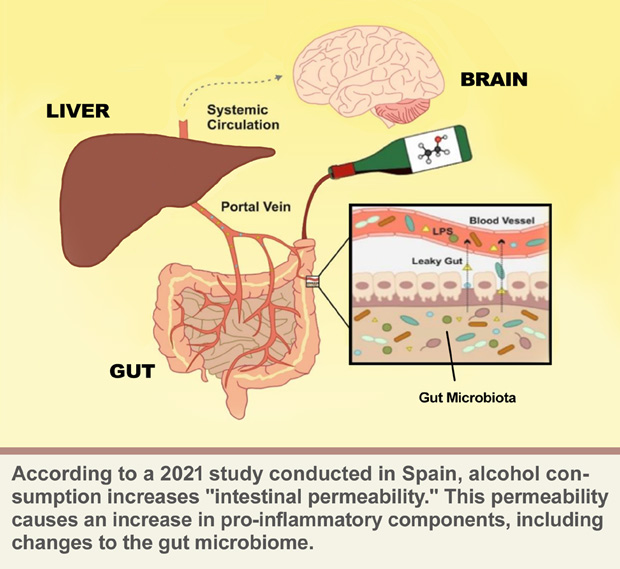The holiday season presents a twin attack on the immune systems of many people because both sugar and alcohol consumption increase.
But even before the holiday onslaught you may have noticed that heavy drinkers get sick frequently.
This happens because heavy alcohol consumption contributes to systemic inflammation by interfering with the body’s natural defenses. Most of this “interfering” happens in the gut.
According to a 2010 study published in World Journal of Gastroenterology, “Chronic alcohol use impairs the balance of microflora in the gut, the gut barrier function… When these defenses are impaired, systemic inflammation ensues.”
A 2021 Spanish study, published in Molecular Sciences, came to similar conclusions:
“Chronic excessive alcohol consumption causes inflammation in a variety of organs, including the gut, brain and liver. While alcohol has direct effects on the gastrointestinal tract when it comes into touch with the mucosa, the majority of alcohol’s biological effects are due to its systemic dispersion and delivery through the blood. Alcohol has been proven to affect the microbiome in the gastrointestinal tract, with alcoholics having a different and higher bacterial load in their gut.”
According to the National Institutes of Health, about 3 million deaths worldwide each year are linked to use of alcohol; moreover, even moderate amounts of alcohol consumption can have harmful effects on health.
The most well-known disease associated with heavy alcohol drinking is liver disease; however, alcohol consumption is also associated with chronic pancreatitis, mental health issues, and certain cancers such as gastric cancer and colorectal cancer.
Now, new research, published in 2023, is shedding more light on how alcohol also damages other areas of the gastrointestinal system—specifically the small and large intestines.
In the study findings, published in the journal eGastroenterology, researchers went into great detail to explain the complicated processes that can ultimately lead to alcohol-associated bowel disease.
The researchers pointed out how the body instantly begins to metabolize alcohol once it enters the digestive tract. The ethanol in the alcohol is then broken down by the liver into a carcinogenic compound called acetaldehyde.
Although acetaldehyde is eventually broken down further into acetate—with the water and carbon dioxide being expelled by the body—it can still have damaging effects before the process concludes.
Included in those damaging effects are changes to gut composition.
R E L A T E D
Poor gut health is causing your junk food cravings!
If you’re trying to incorporate healthier foods into your diet but find you’re still continually craving junk food, the challenge you’re facing is not really in training your brain—it’s overcoming the signals emanating from your gut!
More precisely, the real challenge is training the trillions of bacteria residing there, and getting them to send the right signals.
Learn more >>>
“Ethanol, as well as acetaldehyde and acetate produced by ethanol metabolism, may promote and/or contribute to bowel pathogenesis via different mechanisms, including gut microbiome-related changes and intestinal epithelial/immune dysfunctions,” wrote Dr. Luca Maccioni, a postdoctoral fellow in the Laboratory of Liver Diseases and Laboratory of Physiologic Studies at the National Institutes of Health and lead author of the study.
Another 2023 study examined links between binge drinking and gut health.
The study, conducted on 71 young adults who binge drink, found the study participants displayed altered gut microbiomes after participating in binge drinking.
The researchers further reported that in this “altered” state, the study participants were “associated with a poorer ability to recognize emotions and alcohol cravings.”
The research, conducted at University College Cork in Cork, Ireland, adds a new dimension to the study of how alcohol damages gut health. According to the researchers, it shows changes in the gut are also connected to cravings, emotions and overall neurological processing.
In short, the very destruction of the microbiome caused by alcohol consumption creates a cycle that makes a person even more susceptible to alcohol cravings.
“Changes in the gut microbiome composition and the neuroactive potential were associated with higher craving over time, constituting interesting candidates for early biomarkers of dependence,” wrote Dr. Carina Carbia, the lead researcher of the study and a postdoctoral fellow, in a media release.
The study details were published in the journal EBioMedicine in March 2023.
If you’d like to restore your beneficial bacteria and “re-program” the gut, check out Optimal Flora Blitz 100 from Optimal Health Systems.
Flora Blitz 100 provides over 100 billion CFU of friendly flora for quick fat loss, mindset improvement, and an increase in energy levels. Click the banner ad on this page to learn more.
– – –
Sources: World Journal of Gastroenterology, Molecular Sciences, eGastroenterology, EBioMedicine.


